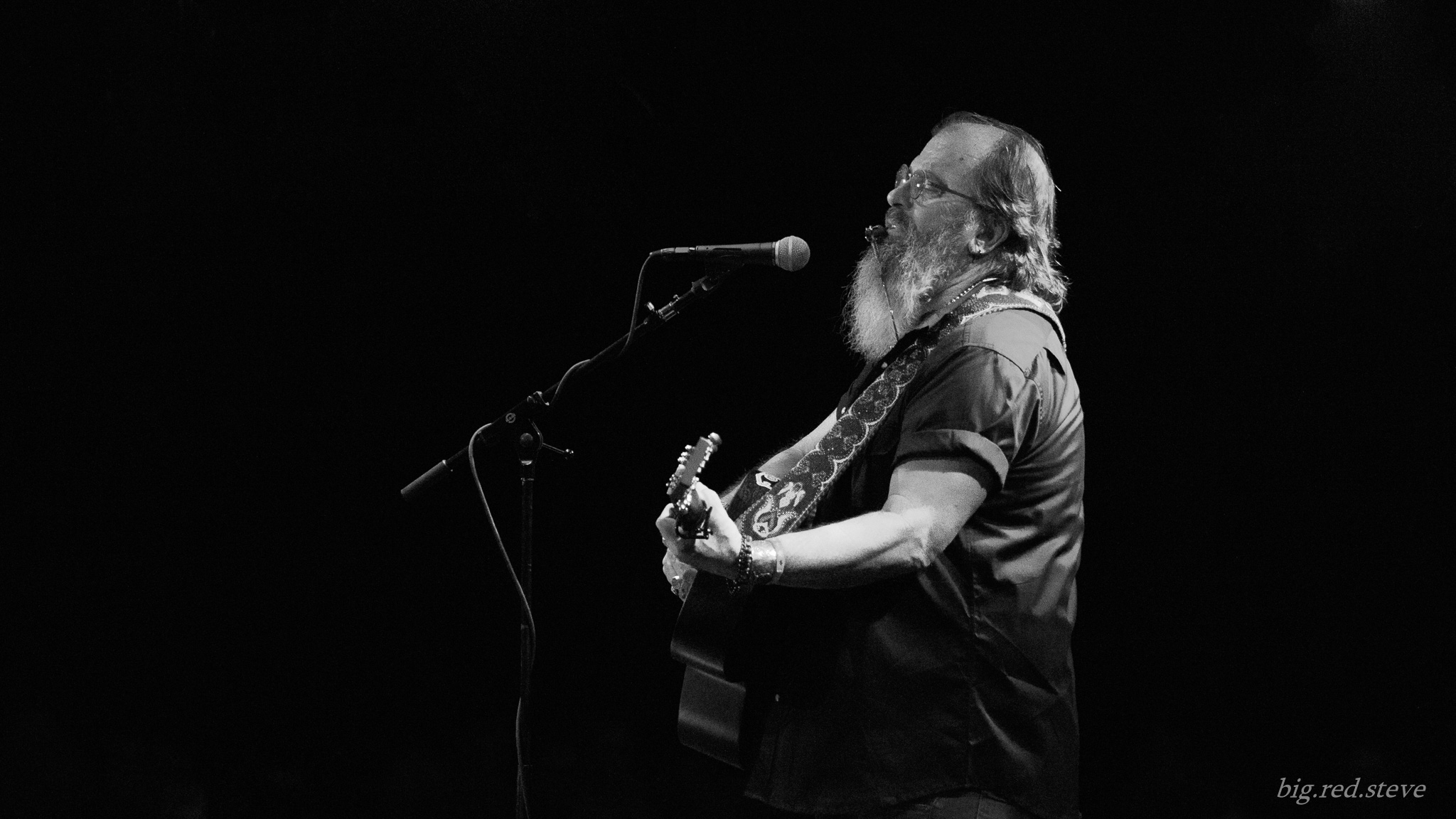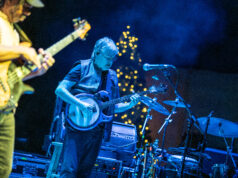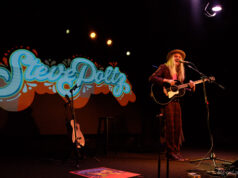Steve Earle finished his recent show at The Birchmere by playing “Pilgrim.” The song was recorded as the closing track on the The Mountain, his 1999 foray into bluegrass that saw him collaborating with The Del McCoury Band. Earle told the audience that he wrote the song for the funeral of Roy Huskey, Jr., who he called “the best doghouse bass player in Nashville.”
Over the years, Steve said, he and Emmylou Harris have “repurposed” the song, but “tonight I’m going to play it for its original purpose, and I’ll probably play it on every night of this tour.”
On June 14, Jeremy Tepper, a musician and the director of programming for the Sirius XM Outlaw Country channel, unexpectedly passed away from a heart attack at the age of 60. It was Tepper who brought Earle into the Sirius XM family, and Steve credited Jeremy with helping him improve as a radio host.
Jeremy’s passing was one of several losses Earle has weathered in the past several years. A few months ago, his mother passed away. In 2019, Kelley Looney, who’d played bass in his band, The Dukes, for 30 years, died. And at the height of the Covid epidemic, he lost his oldest son, fellow singer-songwriter Justin Townes Earle, to a drug overdose caused by an eight-ball of cocaine laced with the opiate fentanyl. And so Steve was in a forlorn mood for this date at The Birchmere on June 17.
Toward the end of his set, Earle paid tribute to JTE, whom he called Cowboy. He told the audience, “I know you’re not supposed to say this, but I loved him more than anything else in this world.” He cited Ram Dass, “His legacy is my pain,” saying that the cliche that a parent should never have to bury a child never made sense to him, because it happens every day. Steve warned the audience about the presence of fentanyl in all kinds of drugs, and exhorted them to be careful, before playing one of Justin’s most beloved compositions, “Harlem River Blues.”
Watch Steve Earle perform “Harlem River Blues” for Paste on YouTube:
Steve is, above all else, a survivor. He credited his teenage son, John Henry, who is autistic and nonverbal, with helping him to keep going, saying that his purpose is to ensure he will be cared for after Steve is gone. He mentioned he now can only tour for three months a year. Someone tried to ask why, which he ignored and kept going. But the reason is that John Henry lives with him in New York City so he can attend the Keswell School, a specialized institution that serves autistic children. The three months correspond to John Henry’s summer break.
Speaking of New York, Earle kicked things off with “Tennessee Blues,” which appeared on Washington Square Serenade, the first album he made after moving to the Big Apple. “The redhead left and the blue dog died,” he said, “but I’m still in New York.”
For all he’s endured in the past half-decade, Steve’s sparkling wit and humor still shine. “Most murders in the home occur in the kitchen,” he said, “because that’s where the weapons are. Unless there’s a handgun. Then it happens in the bedroom, because that’s where the gun is. And it’s where you get caught.” And with that, he played “The Devil’s Right Hand,” a song that has, over the years, come to be an anti-gun message.
The set was off to a hot start, and it stayed hot with three songs from his 1986 debut: “My Old Friend The Blues,” “Someday,” and the title track, “Guitar Town.” The first has been covered by artists ranging from country stalwarts Patty Loveless and T. Graham Brown to Scottish rock band The Proclaimers, while the second has been called “the best Springsteen song the Boss never wrote.” “Guitar Town” has been cited as an influence on her writing by Margo Price.
Watch official music video for “Guitar Town” by Steve Earle on YouTube:
Things continued with “I Ain’t Ever Satisfied,” and Steve got the audience involved, singing the refrain. After that was “Tom Ames’s Prayer,” which he recalled writing shortly after moving to Nashville when he was 20. “I’m pretty proud of that song,” he said, “but it’s exactly the kind of song ones writes when one is 20. This next song is one you write when you’re pushing 60, which I’ve blown way past now.” After playing “God Is God,” Steve said he hoped someone would record the song and put it up on Youtube for Bill Maher. While everyone is “free to believe what they want to believe,” he said, “atheism, as far as I can tell, is a fundamentalist religion. It’s pretty intolerant.”
Between songs, Earle mentioned that, because, his touring time is limited, he can’t go all the places he might like ever year. Most of the places he’s repeated this summer were where he could see grandchildren. The Birchmere, as one of his favorite venues is an exception. He added that he had to be sure in the future not to book the venue on a night when the seafood restaurant RT’s was closed, which got a big cheer and applause from the crowd.
“Taneytown,” a harrowing tale of the horrors of racism, was up next. After playing it, Steve went on a bit of a detour with a story about how the great mandolin player Ronnie McCoury gifted him revisionist historian Stephen Ambrose’s account of the Lewis & Clark expedition, Undaunted Courage. He said that the story “didn’t really have anything to do” with the next song, “You Know The Rest,” but it kind of did, because “Manifest Destiny is probably the ultimate revisionist history.”
“Goodbye,” Earle explained, was the first song he wrote after getting sober in the mid-’90s. He then moved into the “chick song portion of the ending,” which he said he does to prevent his audience from solely growing “uglier and hairier.” As a kid growing up in Texas who didn’t play football, music was his only shot at getting girls. “Every Part of Me,” he said, “is what happens when you’re lonely in East Anglia, and “You’re The Best Lover That I Ever Had” is “another way to get to the same place.”
“South Nashville Blues,” he told the audience, referring to his time before getting sober, “has a tendency to make that part of my life sound way more fucking fun that it was.” To remind himself of what he went through, he follows that song every night with “CCKMP”) (“Cocaine Cannot Kill My Pain”). “Welcome to my nightmare,” he said.
The title track of his excellent 2000 album, Transcendental Blues, was up next, followed by “Angel Is The Devil,” which he recorded for his acoustic comeback album, Train a Comin’. The last album he released, 2022’s Jerry Jeff, paid tribute to one of his three original teachers, the late Jerry Jeff Walker. (The others were Townes Van Zandt and Guy Clark, who he’s also recorded tribute records to.) Earle spoke at length about what Walker meant to him and the Texas music scene, and how he shaped the career of artists like Jimmy Buffett. It was at Walker’s funeral, where he sang “My Old Man,” that Steve last saw Buffett before he, too, passed. He played Walker’s best-known song, “Mr. Bojangles,” which he said he’d been playing since he was 14.
The last album of original material he put out was 2020’s Ghosts of West Virginia, which consisted of the songs he wrote for a Broadway play about the Upper Big Branch mine explosion, Coal Country. “It’s About Blood” is Earle at his best: full of righteous fury at the injustices faced by every day people. “It’s not a coincidence,” he said, that Upper Big Branch was the first non-union mine on that mount, because “That’s what trade unions do. They protect people.”
After paying tribute to Justin, Steve closed the set on mandolin with two of his most beloved songs, the Celtic influenced “Galway Girl” and the rebel anthem “Copperhead Road.”
Watch the official music video for “Copperhead Road” by Steve Earle on YouTube:
The evening began with an excellent set by young guitarist Jack Wharff, an incredibly skilled picker. He started with Pink Floyd’s “Time” in the style of the cover by Greensky Bluegrass, which he told the audience he learned for his dad. Next up was “Moonshine Man,” which is “about a grump old moonshine man who lives in the hills.” Things continued with “Dawn” and “Picture Perfect,” which he introduced as “a love song for the ladies.” Jack and his band wrote “Blue Collar Boy” with Nashville songwriter Ben Chapman. “Sunburn Summer,” he explained, is “about a boy falling in love with a girl over a summer, and, by the end of the summer, she’s nothing but a sunburn.” John Hartford’s “Gentle on My Mind,” he noted, is his father’s favorite song. Jack tied things up with a song just released on June 5, about someone who ends up in the Richmond City Jail.
Wharff’s set was well-received by the audience, who gave him a standing ovation. This was Steve giving back by helping lift upcoming musicians, in much the way his teachers and mentors helped him, so many years ago now. And while the toll of the years is noticeably evident in Steve’s voice at times, it lends a certain gravitas to the intensity and emotional commitment he always brings to his masterful songs, a body of work which is among the best in American music in my lifetime. A successful solo acoustic set, especially one that runs nearly two hours, requires top-notch material and the requisite intensity to connect with and hold the audience’s attention. Earle had the crowd in the palm of his hand: at times, you could’ve heard a pin drop. It was truly a master class in musicianship, craft, and performance.
Here are a few photos of Jack Wharff performing at The Birchmere on June 17, 2024. All pictures by Steve Satzberg.
And here are some photos of Steve Earle headlining The Birchmere this day! All pictures copyright and courtesy of Steve Satzberg.





















